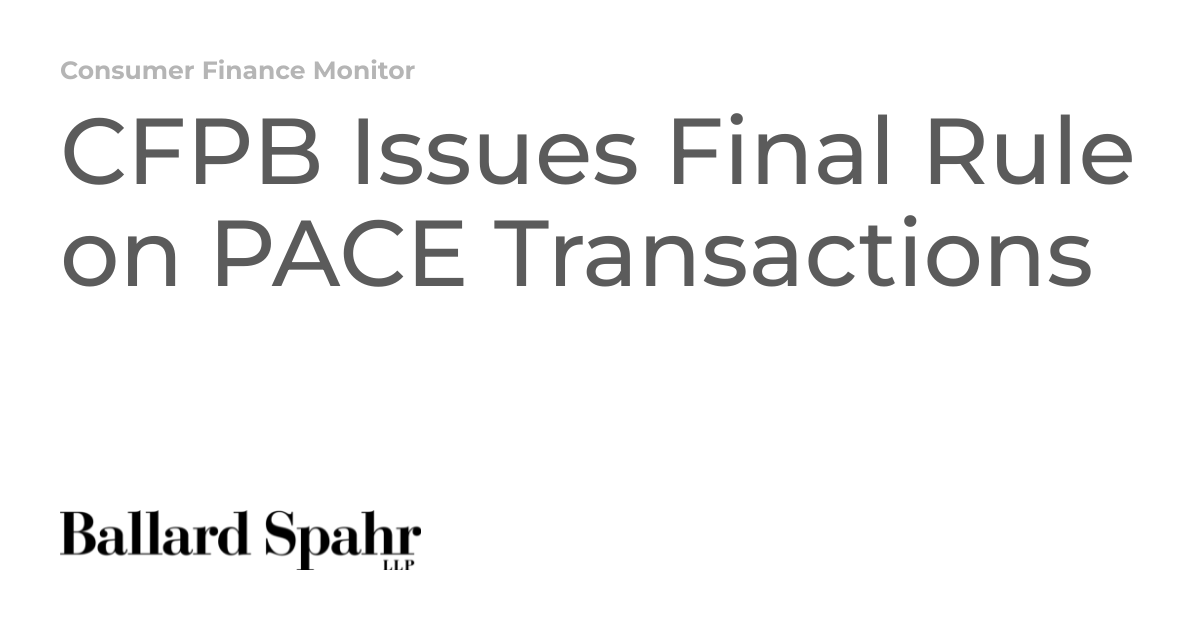- Improve your finances this year by eliminating these 5 charges on your credit card that banks don’t want you to know about
- Personal Finance Tips From The Remote Work Boom
- What We Need to Do to Protect Retirees’ Financial Security
- BioNTech to pay $791.5M in settlement agreement with the NIH
- Dogecoin vs Shiba Inu: Which Meme Coin Will Lead in 2025?
As previously reported, the Economic Growth, Regulatory Relief, and Consumer Protection Act (Act), enacted in 2018, directs the CFPB to prescribe regulations that apply Truth in Lending Act (TILA) ability-to-repay (ATR) requirements to Property Assessed Clean Energy (PACE) transactions, and apply the TILA civil liability provisions to violations of the requirements. The CFPB recently issued a final rule that more broadly applies TILA requirements, with certain revisions and exemptions, to PACE transactions. The final rule is effective March 1, 2026.
You are viewing: CFPB Issues Final Rule on PACE Transactions
See more : A greener 2025: What’s next for forests, climate finance and nature?
For purposes of the final rule a PACE transaction is defined as “financing to cover the costs of home improvements that results in a tax assessment on the real property of the consumer.” The CFPB explains in the preamble to the final rule that:
“PACE financing enables property owners to finance upgrades to real property through an assessment on their real property. Eligible upgrade types vary by locality but often include upgrades to promote energy efficiency or to help prepare for natural disasters. The voluntary financing agreements are made between the consumer and the consumer’s local government or a government entity operating with the authority of several local governments, and they leverage the property tax system for administration of payments. PACE financing is repaid through the property tax system alongside the consumer’s other property tax payment obligations. PACE loans are typically collected through the same process as real property taxes. Local governments typically fund PACE loans through bond issuance. PACE assessments are sometimes collateralized and sold as securitized obligations.” (Footnotes omitted.)
The CFPB also notes that PACE financings are secured by a lien on the consumer’s real property, and that the lien typically has priority under state law similar to that of other real property tax liens, which are superior to other mortgage liens on the property, including those that predated the PACE lien.
See more : Your Year-End Financial Action Plan, Part 4: Maximizing Retirement
Currently the Regulation Z Commentary excludes tax liens and tax assessments from being considered credit. To cover PACE transactions, the final rule amends the Commentary to narrow the exclusion to involuntary tax liens and involuntary tax assessments. Based on this revision, PACE transactions, which result in voluntary tax assessments, will now be considered credit for TILA purposes. As a result, PACE transactions will be subject to TILA/Regulation Z provisions applicable to mortgage loans, with various revisions and exemptions made in the final rule. Among other TILA requirements, based on the final rule PACE transactions will be subject to:
- The general ability to repayment requirements, with certain revisions, and will not be eligible for qualified mortgage status.
- Disclosure requirements, including the TILA/Real Estate Settlement Procedures Act (RESPA) Integrated Disclosure (TRID) rule disclosure and waiting period requirements. The rule includes model versions of the Loan Estimate and Closing Disclosure that are modified to account for the unique nature of PACE transactions. However, the transactions are exempted from the periodic statement disclosure requirements.
- Higher-priced mortgage loan (HPML) requirements, although they are exempt from the HPML escrow account requirement. Transactions above a certain threshold will be subject to the HPML appraisal requirements. The threshold for 2024 is $32,400 and for 2025 is $33,500. As noted above, the rule will become effective March 1, 2026. In late 2025 the threshold will be inflation-adjusted for 2026. In the preamble to the final rule the CFPB states it “understands that PACE companies typically do not obtain written appraisals for properties securing PACE transactions, relying instead on automated valuation models.” Based on a study of PACE transactions that the CFPB conducted in connection with the development of the final rule, the CFPB determined that about a quarter of PACE transactions exceed the threshold and, thus, would require an appraisal.
- High-cost mortgage loan requirements. Based on a study of PACE transactions that the CFPB conducted in connection with the development of the final rule, it found that the transactions generally would not trigger the high-cost mortgage loan requirements based on the annual percentage rate or prepayment penalty triggers, but about 35% of the transactions would trigger the requirements based on the points and fees trigger. The CFPB acknowledges in the preamble to the final rule that there are high-cost mortgage loan requirements that “may be difficult for PACE companies to comply with. This could lead to PACE companies declining to make PACE transactions that would be high-cost mortgages.”
- Loan originator qualification and compensation requirements. This may result in home improvement contractors who solicit PACE transactions having to comply with the requirements.
- Right of rescission requirements. PACE transactions already can be subject to right to cancel requirements under state laws authorizing the transactions or industry practice.
The final rule could face obstacles. The CFPB will submit the rule to Congress under the Congressional Review Act, and Congress could decide to strike down the rule, even though it directed the CFPB in the Growth Act to extend the ability to repay requirements and civil liability provisions to PACE transactions. Potentially, Congress may believe that the CFPB went too far in extending all of TILA’s provisions, with revisions and exemptions, to the transactions. Congress also could amend or repeal the authorizing provision in the Growth Act. The final rule also may face challenges from private parties or state government entities. PACE industry members commenting on the proposed rule believed subjecting PACE transactions to TILA requirements in general was beyond the CFPB’s statutory authority, with some noting in particular that the Growth Act only refers to subjecting the transactions to the ability to repay requirements and civil liability provisions.
Source link https://www.consumerfinancemonitor.com/2024/12/31/cfpb-issues-final-rule-on-pace-transactions/
Source: https://summacumlaude.site
Category: News







